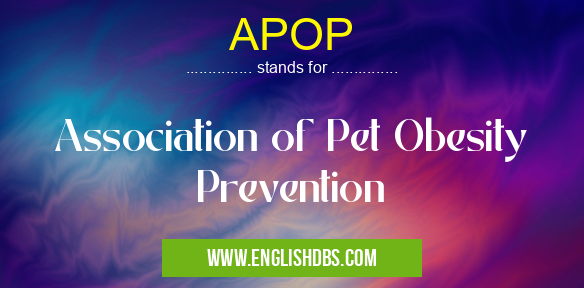What does APOP mean in PREVENTION
APOP stands for Association of Pet Obesity Prevention, an organization dedicated to educating pet parents and veterinarians about the dangers of pet obesity and how to promote healthy lifestyles for pets. The mission of APOP is to provide resources that empower the veterinary community to better recognize and manage animal obesity in order to improve pet well-being. APOP seeks to provide education, evidence-based guidelines, research and advocacy initiatives in order to create a healthier future for our furry friends.

APOP meaning in Prevention in Medical
APOP mostly used in an acronym Prevention in Category Medical that means Association of Pet Obesity Prevention
Shorthand: APOP,
Full Form: Association of Pet Obesity Prevention
For more information of "Association of Pet Obesity Prevention", see the section below.
» Medical » Prevention
Essential Questions and Answers on Association of Pet Obesity Prevention in "MEDICAL»PREVENTION"
What is the Association of Pet Obesity Prevention (APOP)?
The Association of Pet Obesity Prevention (APOP) is a national organization dedicated to reducing pet obesity through public education and advocating for obesity prevention and management as part of routine veterinary care. The organization also helps to raise awareness about the importance of good nutrition and regular physical activity for pet health.
What are the dangers associated with pet obesity?
Pets that are overweight or obese may be at risk for various medical conditions including joint problems such as arthritis, diabetes, heart disease, high blood pressure, some types of cancer, respiratory problems, and decreased life expectancy.
How can I tell if my pet is overweight?
Common indicators that a pet may be overweight include an inability to feel their ribs when touched; having excess fat on the neck or back; having a round profile; having difficulty rising from lying down; breathing heavily or tired quickly during exercise; and having folds under the belly.
Are there any dieting tips I should follow when trying to help my pet lose weight?
Yes! You'll want to feed your pet high-quality meals in smaller portions several times during the day. Make sure they're getting plenty of exercise each day as well - 30 minutes for cats and 45 minutes for dogs - but avoid over-exertion since it can cause injury. Try to limit treat consumption as much as possible too.
What type of food should I be feeding my pet?
It's important to feed your pet food that fits their individual nutritional needs based on age, breed, lifestyle, health status, etc. Look for foods with high-quality proteins like chicken or fish rather than by-products like corn gluten meal and wheat middlings. Choose foods that contain fewer fillers such as corn and rice bran so your pets get more nutrition per serving size.
How often should I take my pet to the veterinarian?
It's important to bring your pet in at least once a year for routine visits with their veterinarian so they can receive preventive care including healthy weight maintenance advice. If there are any concerns about your pet's weight or eating habits, make sure to consult with your veterinarian right away so appropriate measures can be taken before serious issues develop.
Are there any supplements I should give my pet while trying to manage their weight?
Supplements used in conjunction with proper dietary intake and exercise can help support healthy weights in pets when recommended by a veterinarian. However, it's essential not to give supplements without consulting your vet first because certain supplements may interact adversely with medications or cause other health complications depending on each individual animal’s age/breed/health history/etc.
Can I just feed my dog vegetables instead of regular puppy food?
Vegetables are great sources of natural nutrients that can also provide fiber which aids digestion – however they shouldn’t be used exclusively instead of complete nutrition puppy food products which have been specifically formulated to provide all necessary vitamins & minerals needed for healthy growth & development without risk of nutrient deficiencies.
Final Words:
In conclusion, APOP stands for “Association of Pet Obesity Prevention” which works towards raising awareness about the risks associated with excessive weight gain in animals through education, evidence-based guidelines and research initiatives. Through its efforts, APOP hopes to create a healthier future not only for pets but also their owners by promoting responsible caring habits within both groups.
